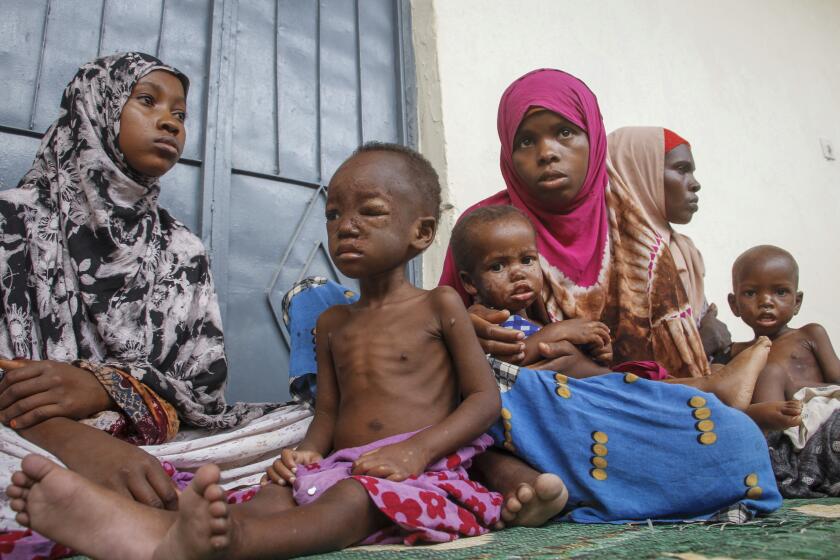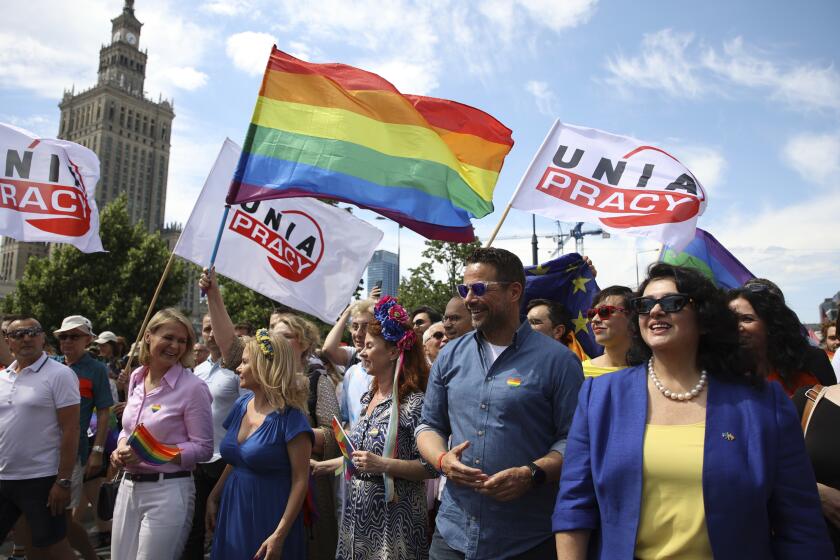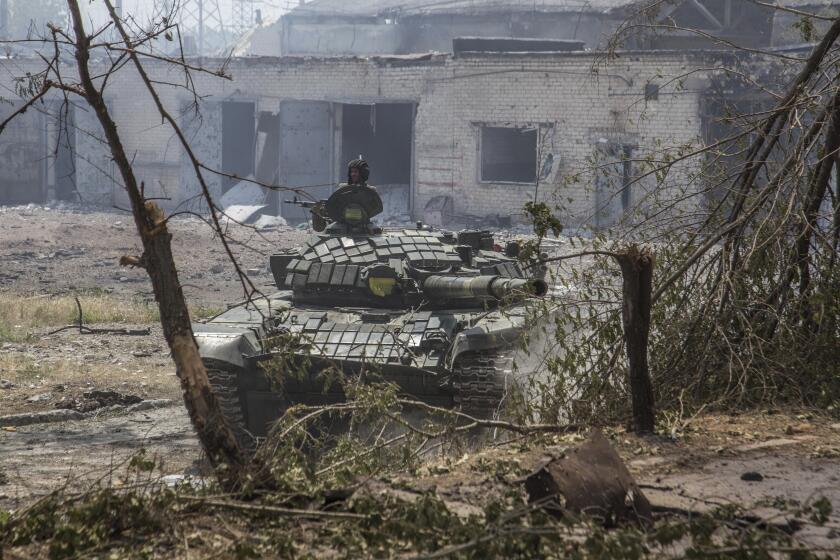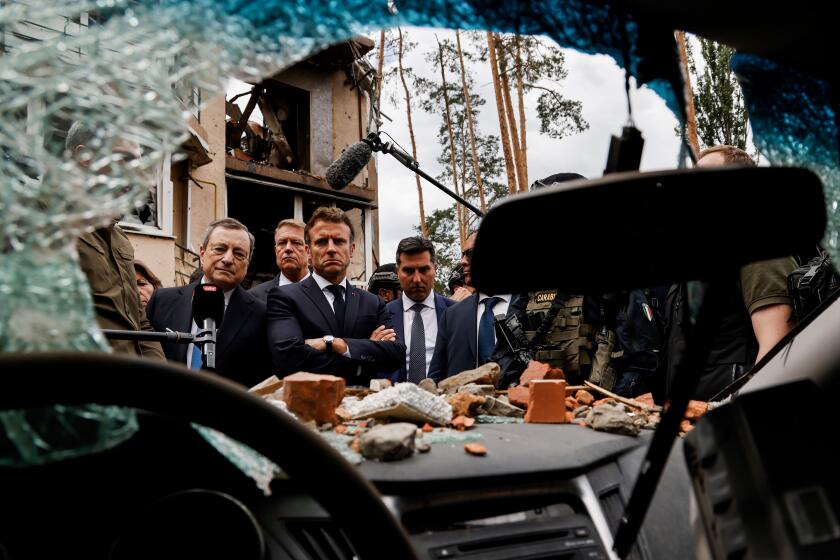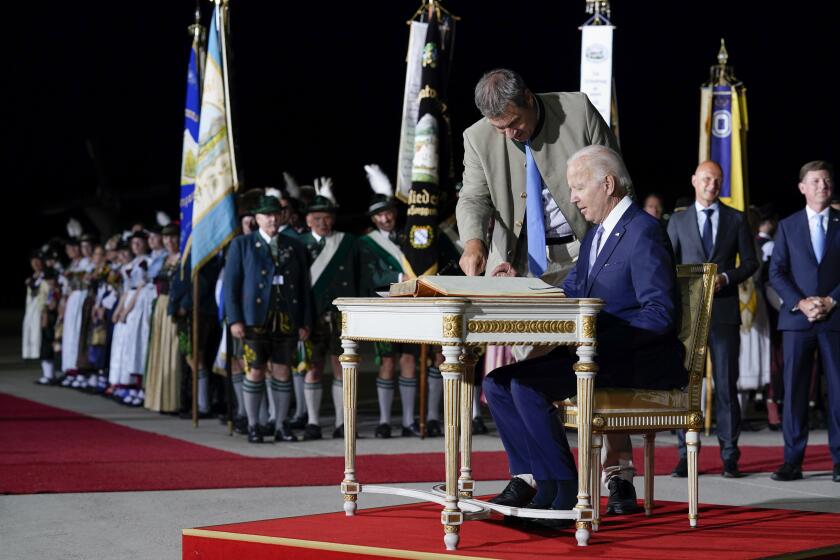After conferring with Zelensky, G-7 pledges to support Ukraine ‘for as long as it takes’
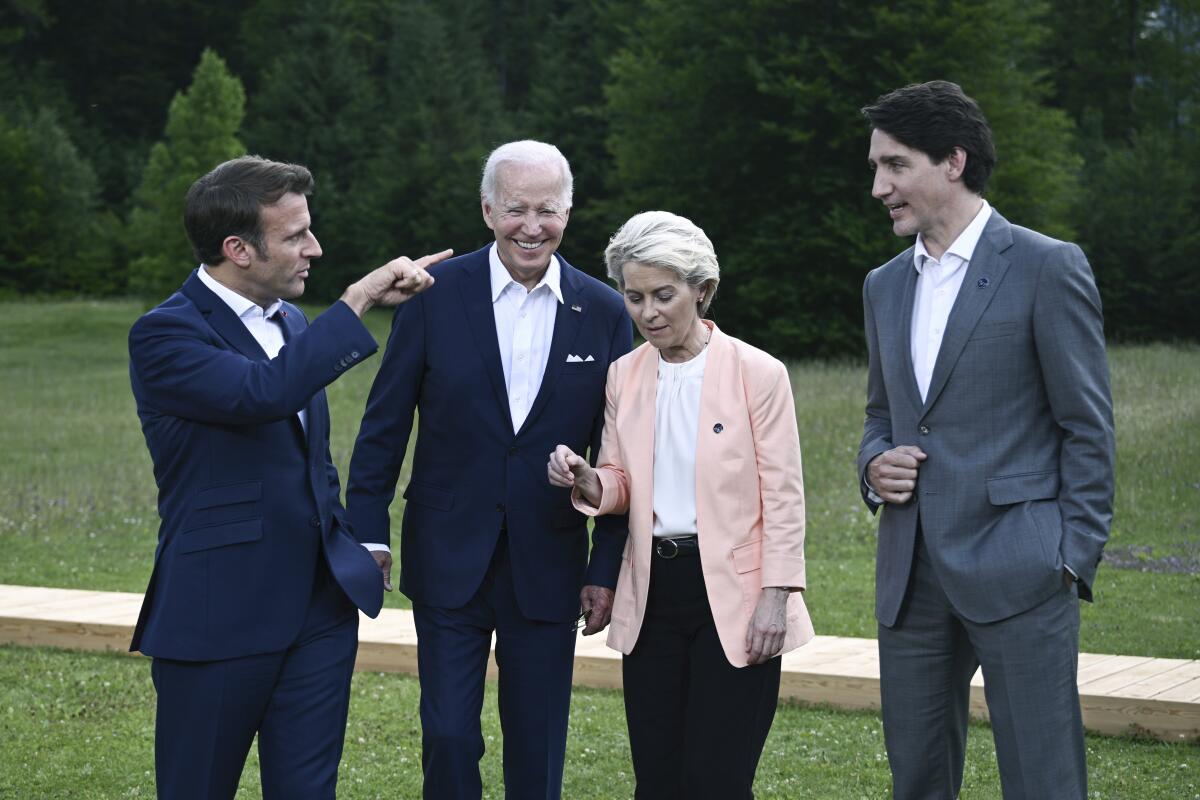
- Share via
ELMAU, Germany — Leading economic powers conferred by video link with Ukrainian President Volodymyr Zelensky on Monday as they underscored their commitment to Ukraine for “as long as it takes” with plans to pursue a price cap on Russian oil, raise tariffs on Russian goods and impose other new sanctions.
In addition, the U.S. was preparing to announce the purchase of an advanced surface-to-air missile system for Kyiv to help Ukraine fight back against Russian President Vladimir Putin’s aggression.
The new aid and efforts by the Group of 7 leaders to punish Moscow come as Zelensky has openly worried that the West has become fatigued by the cost of a war that is contributing to soaring energy costs and price hikes on essential goods around the globe.
U.S. national security advisor Jake Sullivan said Zelensky’s top request was for further air-defense systems. Sullivan said most of the conversation was “about the way forward and how President Zelensky sees the course of the war.” Zelensky also briefed the G-7 leaders on how his administration has used the assistance received to date ”to maximize Ukraine’s capacity both to resist Russian advances and to pursue counterattacks where possible,” Sullivan said.
Sullivan added that the Ukrainian leader was “very much focused on trying to ensure that Ukraine is in as advantageous a position on the battlefield as possible” in coming months because “he believes that a grinding conflict is not in the interest of the Ukrainian people.”
Zelensky also told the leaders that now is not a time for negotiation with Russia because he needs to be in stronger position first, according to a senior French diplomat. The Ukrainian leader said that “he will negotiate when he will be in a position to do so,” said the diplomat, who spoke under condition of anonymity in line with the French presidential office’s customary practices.
Leading foreign ministers meet to confront global food insecurity crisis, facing conflict, climate change and COVID. Millions could die.
“His goal is to end the war as quickly as possible and to get out of it in the best possible position, so that he can negotiate from a position of strength,” the diplomat said, adding that Zelensky told the summit leaders that he needed economic, financial and military support.
After hearing from Zelensky, the leaders pledged in a statement to support Ukraine “for as long as it takes.” They underlined their “unwavering commitment to support the government and people of Ukraine” in the battle for their country’s sovereignty and territorial integrity.
They said it was up to Ukraine to decide on a future peace settlement.
G-7 leaders were finalizing the deal to seek a price cap during their three-day summit in the German Alps. The details of how a price cap would work, as well as its impact on the Russian economy, were to be resolved by the G-7 finance ministers in the coming weeks and months, according to a senior Biden administration official who spoke on the condition of anonymity to preview the announcements from the summit.
KyivPride moved to Poland this year and was a platform to keep international attention focused on Ukraine’s struggle against Russia.
The largest democratic economies will also commit to raising tariffs on Russian imports to their countries, with the U.S. announcing new tariffs on 570 categories of goods. The G-7 countries will seek sanctions targeting Russia’s defense supply chains that support its effort to rearm during the war.
President Biden is set to announce that the U.S. is providing an advanced antiaircraft system to Ukraine, as well as additional artillery support, according to a person familiar with the matter, in the latest assistance meant to help the country defend itself against Russia’s bloody invasion.
The U.S. is purchasing NASAMS, a Norwegian-developed antiaircraft system, to provide medium- to long-range defense, according to the person, who spoke on the condition of anonymity. NASAMS is the same system used by the U.S. to protect the sensitive airspace around the White House and U.S. Capitol.
Additional aid includes more ammunition for Ukrainian artillery, as well as counter-battery radars, to support its efforts against the Russian assault in the Donbas, Ukraine’s eastern industrial heartland, the person said. Biden is also announcing a $7.5-billion commitment to help Ukraine’s government meet its expenses, as part of a drawdown of the $40-billion military and economic aid package he signed into law last month.
Ukraine’s months-long defense in Severodonetsk ends, giving Russian forces control of most of Luhansk province.
The G-7 leaders began Monday’s session of their three-day summit with a focus on Ukraine. They were later joined by the leaders of five democratic emerging economies — India, Indonesia, South Africa, Senegal and Argentina — for a discussion on climate change, energy and other issues.
German Chancellor Olaf Scholz, the summit host, said the G-7 countries’ policies on Ukraine are “very much aligned,” and that they see the need to be both tough and cautious.
Scholz said after meeting with Canadian Prime Minister Justin Trudeau on Monday that “we are taking tough decisions” to help Ukraine “as much as possible, but that we also avoid that there will be a big conflict between Russia and NATO.”
British Prime Minister Boris Johnson said that, under the circumstances, the G-7 has to “continue to help the Ukrainians to rebuild their economy, to get their grain out, to export their grain, and, of course, we have to help them to protect themselves. And that’s what we’re going to continue to do.”
McManus: War in Ukraine is a battle of wills and economic pain — and the West is showing fatigue
As Russia retaliates for the West’s sanctions over the war, the economic pain is adding to ‘Ukraine fatigue’ in the U.S. as well as Europe.
Biden said Sunday that Putin “has been counting on, from the beginning, that somehow NATO and the G-7 would splinter, but we haven’t and we’re not going to.” Johnson warned the leaders not to give in to “fatigue.”
Biden hopes to use his trip to Europe to proclaim the unity of the coalition pressing to punish Russia for its invasion, and to urge allies to do even more — seeking to counter doubts about the coalition’s endurance as the war grinds into its fifth month.
Scholz said last week that he wants to discuss the outlines of a “Marshall Plan for Ukraine” with his G-7 counterparts, referring to the U.S.-sponsored plan that helped revive European economies after World War II.
With the war still in progress and destruction mounting by the day, it’s unlikely to be a detailed plan at this stage. Scholz has said that “rebuilding Ukraine will be a task for generations.”
President Biden says the Group of Seven leading economies will ban imports of gold from Russia
The G-7 already is committed to help finance Ukraine’s immediate needs. Finance ministers from the group last month agreed to provide $19.8 billion in economic aid to help Kyiv keep basic services functioning and prevent tight finances from hindering its defense against Russian forces.
A senior Biden administration official, speaking on condition of anonymity to discuss private conversations between the G-7 leaders, said the U.S. and Europe were aligned in their aims for a negotiated end to the conflict, even if their roles sometimes appeared different.
Scholz and French President Emmanuel Macron have tried to facilitate that through active conversations with Putin and Zelensky, while also supplying weapons to Ukraine. The U.S. has largely cut off significant talks with Russia and aims to bolster Ukraine’s battlefield capacity as much as possible so that its eventual position at the negotiating table is stronger.
The endurance of the tough sanctions on Russia may ultimately come down to whether the G-7 and other leaders can identify ways to ease energy-supply issues and skyrocketing prices once winter hits, as they seek to disengage from Russian sources of fuel.
News Alerts
Get breaking news, investigations, analysis and more signature journalism from the Los Angeles Times in your inbox.
You may occasionally receive promotional content from the Los Angeles Times.
The G-7 meeting is sandwiched between a European Union summit last week that agreed to give Ukraine the status of a candidate for membership — kicking off a process that is likely to take years with no guarantee of success — and a summit of NATO leaders starting Tuesday in Madrid.
The leaders of the G-7 — the U.S., Germany, France, Britain, Italy, Canada and Japan — may hope to make some progress in bringing their counterparts from their five guest countries closer to Western views on sanctions against Russia.
Scholz also is eager to win over such countries for his idea of a “climate club” for nations that want to speed ahead when it comes to tackling the issue of climate change.
More to Read
Sign up for Essential California
The most important California stories and recommendations in your inbox every morning.
You may occasionally receive promotional content from the Los Angeles Times.
